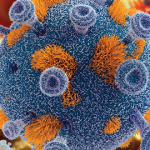Leonard H. Calbrese, DO, FACR, is a professor of medicine at the Cleveland Clinic Lerner College of Medicine of Case Western Reserve University in Cleveland, Ohio. He has extensive experience treating HIV-positive patients as a rheumatologist. “Rheumatologists need to keep this on their radar screen, because there is an aging HIV population that will need care for rheumatic problems that may be totally unrelated to HIV infection, but they have underlying HIV, and that is quite an important co-morbidity,” he explains. “The rheumatic complications of HIV infection itself are decreasing; these are relatively rare complications, but the aging HIV population with gout or osteoarthritis or back pain—these are important.”
A Complex Picture
For practicing rheumatologists, the picture remains complex. We have a relatively poor understanding of the prevalence of various rheumatic conditions in HIV. Epidemiological studies of rheumatic symptoms in the cART era have reported widely different numbers, as recently reviewed.3,4 For example, Hochberg and colleagues concluded that reactive arthritis was not more common in people with HIV, unlike previously believed.10 Others have concluded that musculoskeletal symptoms remain common in these patients.11 We lack good data on the true prevalence of many of these syndromes, and this prevalence may be quite different in areas where many patients are not well controlled with cART therapies.
Another reason for complexity is the variety of causes of rheumatic symptoms in HIV-positive persons. Many patients have unrelated rheumatic symptoms that need treatment, but others have symptoms from syndromes triggered by HIV. These may be caused by the illness itself, or secondarily through medication side effects, such as myopathy from zidovudine.12 Some patients with HIV are also at risk of rheumatic syndromes due to infection with other sexually borne illnesses, such as a reactive arthritis resulting from Chlamydia infection. Additionally, a patient with advanced, uncontrolled HIV may present with rheumatic symptoms from an opportunistic infection, or a person with initial seroconversion may show musculoskeletal symptoms.4
Other types of issues can cause rheumatologic issues in these patients. Karen Walker-Bone, BM, FRCP, PhD, Hon FFOM, is an associate professor in occupational rheumatology at the University of Southampton in Southampton, England. She co-authored an article reviewing management of musculoskeletal disorders in people living with HIV. She recommends also keeping in mind other causes of pain more common in people with HIV, such as peripheral neuropathy and opportunistic malignancies.
Much of the pathophysiology between HIV infection and rheumatic syndromes is not well understood. Sometimes, HIV may transiently improve a rheumatic syndrome, or it may make it worse, depending on context.1,3-7


